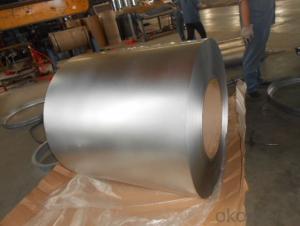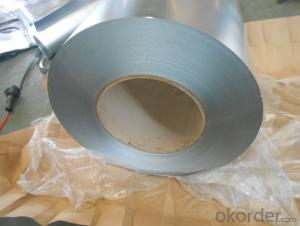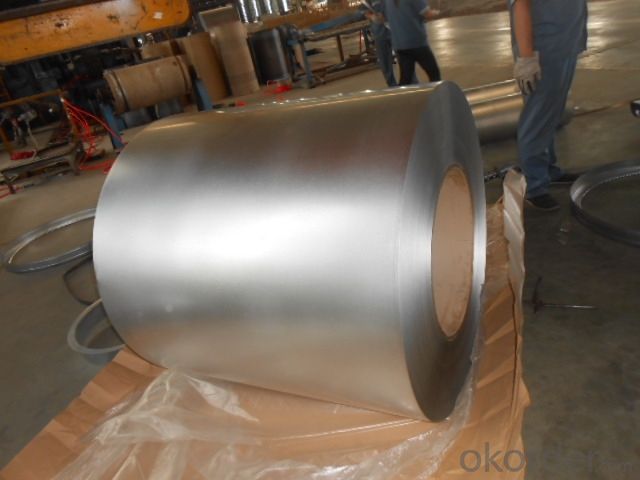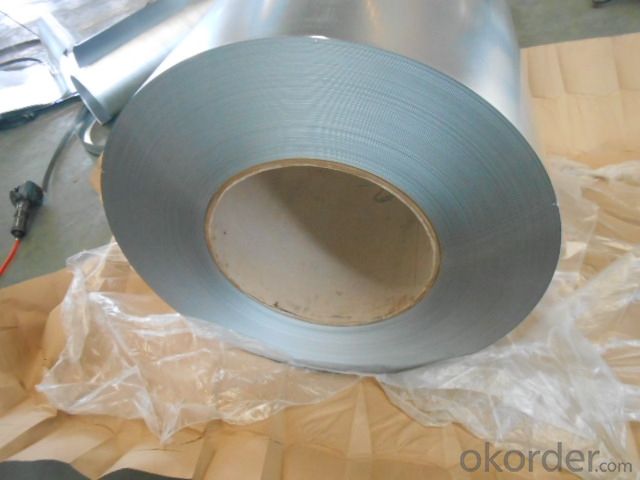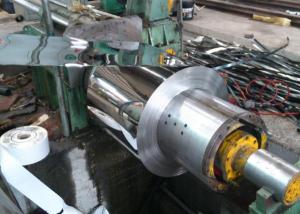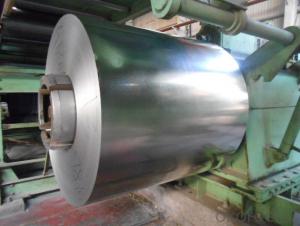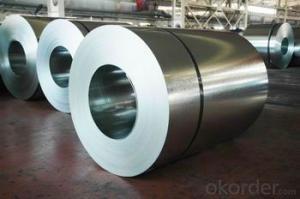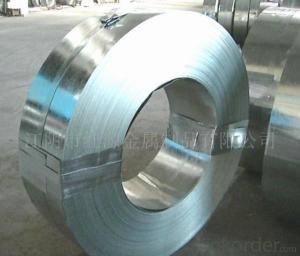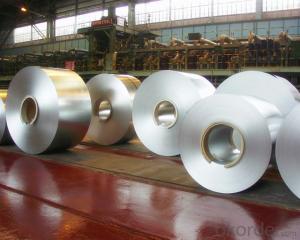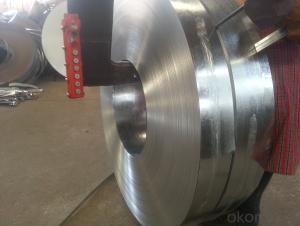High Quality Galvanised Steel in Coil
- Loading Port:
- Tianjin
- Payment Terms:
- TT OR LC
- Min Order Qty:
- 25 m.t.
- Supply Capability:
- 80000 m.t./month
OKorder Service Pledge
OKorder Financial Service
You Might Also Like
Product Description:
Quick Details
| Grade: | galvanized sheet,DX51D+Z SGCC CSB S280GD+Z S350GD+Z | Standard: | JIS,AISI,ASTM,GB,DIN,EN,JIS,AISI,ASTM,GB,DIN | Length: | 500mm-12000mm,1000~6000mm |
| Thickness: | 0.1mm-100mm | Width: | 600mm-2000mm | Place of Origin: | Jiangsu China (Mainland) |
| Brand Name: | DX51D+Z SGCC CSB S280GD+Z S350GD+Z | Model Number: | galvanized sheet,ASTM A653, ASTMA526-90, JIS G3302, DIN EN10142-92, GB/T 2518 | Type: | Plate |
| Application: | indurstry;electricity construction,home appliances,kitchen appliance, mechanical etc | Certification: | SGS | Surface: | Galvanized |
| Technique: | Cold Rolled | Special Use: | High-strength Steel Plate | Delivery Time: | 3-15 days |
| Delivery Term: | TT or LC |
Packaging & Delivery
| Packaging Detail: | Export standard package :bundled wooden box or be required; The inner size of container is below: 20 ft GP:5.8m(length)x 2.13m(width)x 2.18m(high) about 24-26 CBM 40 ft GP:11.8m(length)x 2.13m(width)x 2.72m(high)about 68 CBM We will packing as the factory ,and reach the stander of export . Or as the customer request.In addition,We will make the products with good surface protection |
| Delivery Detail: | within 3--15 days according to the Quantity |
Specifications
China supplier Galvanized Steel Sheet
1:thick:0.25-6mm
2:width:500-1500mm
3:length:any length can be cut
4:on stock
- Q: What are the different types of steel coil loading and unloading methods used during processing?
- There are several different methods used for loading and unloading steel coils during processing. Some common methods include overhead crane lifting, forklift transportation, coil cars, and coil transfer cars. Each method has its own advantages and is chosen based on factors such as the size and weight of the coils, the available equipment, and the layout of the facility.
- Q: How much does a steel coil weigh?
- The weight of a steel coil can vary depending on its size, thickness, and type of steel used. Generally, a standard steel coil can weigh anywhere from a few hundred pounds to several thousand pounds.
- Q: I am looking to weld some stainless steel using stainless electrodes. I was told that the arc welder needs to be able to run in DC in order to be able to weld stainless steel. Is this true? Or can you weld stainless steel with stainless electrodes with AC also?
- Stick Welding Stainless Steel
- Q: What are the common challenges in steel coil manufacturing?
- Steel coil manufacturing often encounters several challenges that manufacturers must address. One key issue involves the need to consistently uphold quality standards throughout the manufacturing process. Meeting precise specifications is crucial for steel coils, as any deviations can result in product defects or rejections. Therefore, constant monitoring and implementing quality control measures at each production stage are necessary. Another obstacle involves optimizing production efficiency and minimizing downtime. The production of steel coils encompasses various intricate processes, including cutting, forming, welding, and finishing. Delays or problems in any of these stages can create production bottlenecks, negatively impacting overall efficiency and productivity. Additionally, challenges arise in the handling and storage of steel coils. Due to their weight, steel coils can be challenging to manipulate, necessitating specialized equipment and proper worker training. Moreover, maintaining appropriate storage conditions is vital to prevent damage from factors like moisture, corrosion, or other environmental elements. Maintaining a safe working environment poses another challenge in steel coil manufacturing. Improper operation or maintenance of the equipment and machinery used in the process can lead to hazardous situations. Therefore, ensuring worker safety and implementing suitable safety protocols are crucial to prevent accidents and injuries. Lastly, fluctuating raw material costs and market demands present challenges for steel coil manufacturers. The profitability of the manufacturing process is significantly influenced by the costs of raw materials like iron ore and scrap metal. Furthermore, market demands for specific steel coil types can fluctuate, necessitating manufacturers to adapt and adjust their production accordingly. To overcome these challenges, careful planning, continuous improvement, and effective resource and process management are essential in steel coil manufacturing.
- Q: How are steel coils used in the manufacturing of automotive bodies?
- Steel coils are used in the manufacturing of automotive bodies as they are rolled into flat sheets and then formed into various car body parts, such as panels and frames. These coils provide the necessary strength and durability to withstand the rigors of daily use and ensure the structural integrity of the vehicles.
- Q: How would you calculate the maximum plastic deformation (expansion) a steel pipe can handle before it actually fails?
- You can calculate the maximum reversible strain, for elastic loading as follows: You need to look up the yield strength (for that particular type of steel). Divide this yield strength by the elastic modulus of steel (also called Young's modulus). That gives you the strain at the onset of yielding, the maximum you can strain the steel fibers before crossing the point of no return. If you are interested in the strain until failure, you need to take tensile test measurements. Seldom do people document an equation to model the non-elastic portion of the stress-strain curve of the specimen, because seldom do we design systems to operate with materials which yield. We want systems which only deform reversibly and elastically. This means you need to perform an experiment to find what you are actually desiring to know.
- Q: I believe steel is stronger but it steel lighter than iron too?
- Steel is iron, with other things added that strengthen it and/or make it less rust liable. So, in general, steel is stronger than iron. In so far as the density, that depends on the steel alloy. Some are higher than iron, some lower. Remember there are hundreds of different steel alloys. edit: but the density is still close to that of iron. density steel 7750 to 8050 kg/m? density iron 7870 kg/m?
- Q: I'm kind of confused as to how the difference between a stainless steel and blued steel firearm is sometimes only $20 or so. Isn't stainless steel fairly more expensive to manufacture than plain carbon steel? Are some stainless steel firearms simply stainless steel finished with carbon steel underneath?
- I don't know that stainless can be laminated to steel very easily. Stainless is a little more expensive. The problem comes in that stainless is much harder to machine that normal gun steel. With laminated steel, you would still have the problem of machining the stainless. Occasionally firearms are nickle plated or barrels are chrome lined.
- Q: What are the benefits of using steel coils in the manufacturing of pipes?
- There are several benefits of using steel coils in the manufacturing of pipes. Firstly, steel coils offer high strength and durability, making them capable of withstanding extreme pressure and temperature conditions. This ensures the longevity and reliability of the pipes. Secondly, steel coils provide excellent corrosion resistance, which is crucial for pipes that come into contact with different substances or are used in corrosive environments. Additionally, steel coils allow for seamless production and fabrication of pipes, resulting in a smooth surface finish and uniform dimensions. Lastly, steel coils are readily available and cost-effective, making them a preferred choice for pipe manufacturing.
- Q: I wanted to know what is steel fabricating?
- Steel Fabricating/or Steel Fabricators is just a fancy way of saying that they sell steel products and a variety of related services. Thomas steel products has a wide range of steel products and services, from Windsor Republic Door Dist, Tie Wire, Steel Doors Frames, Snap Ties, S Parker Hardware Distributor, Reinforcing Steel Detail Drawings Avail, Rebar Fabrication, o_O.
Send your message to us
High Quality Galvanised Steel in Coil
- Loading Port:
- Tianjin
- Payment Terms:
- TT OR LC
- Min Order Qty:
- 25 m.t.
- Supply Capability:
- 80000 m.t./month
OKorder Service Pledge
OKorder Financial Service
Similar products
Hot products
Hot Searches
Related keywords
